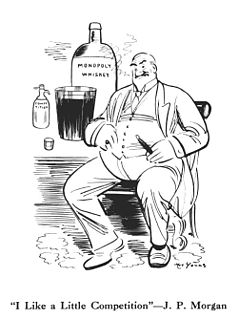
A call centre or call center is a centralised office used for receiving or transmitting a large volume of enquiries by telephone. An inbound call center is operated by a company to administer incoming product or service support or information enquiries from consumers. Outbound call centers are operated for telemarketing, for solicitation of charitable or political donations, debt collection, market research, emergency notifications, and urgent/critical needs blood banks. A contact center, further extension to call centers administers centralized handling of individual communications, including letters, faxes, live support software, social media, instant message, and e-mail.
A common carrier in common law countries is a person or company that transports goods or people for any person or company and that is responsible for any possible loss of the goods during transport. A common carrier offers its services to the general public under license or authority provided by a regulatory body. The regulatory body has usually been granted "ministerial authority" by the legislation that created it. The regulatory body may create, interpret, and enforce its regulations upon the common carrier with independence and finality, as long as it acts within the bounds of the enabling legislation.
Wide Area Telephone Service (WATS) was a flat-rate long distance service offering for customer dial-type telecommunications in some of the countries that adhere to the North American Numbering Plan. The service is between a given customer phone and stations within specified geographic rate areas, employing a single telephone line between the customer location and the serving central office. Each access line could be arranged for outward (OUT-WATS) or inward (IN-WATS) service, or both.
Voice over Internet Protocol (VoIP), also called IP telephony, is a methodology and group of technologies for the delivery of voice communications and multimedia sessions over Internet Protocol (IP) networks, such as the Internet. The terms Internet telephony, broadband telephony, and broadband phone service specifically refer to the provisioning of communications services over the public Internet, rather than via the public switched telephone network (PSTN), also known as plain old telephone service (POTS).
Enhanced 911, E-911 or E911 is a system used in North America to automatically provide the caller's location to 911 dispatchers. 911 is the universal emergency telephone number in the region. In the European Union, a similar system exists known as E112 and known as eCall when called by a vehicle.
Caller ID, also called calling line identification (CLID), Calling Line Identification (CLI), calling number delivery (CND), calling number identification (CNID), calling line identification presentation (CLIP), or call display, is a telephone service, available in analog and digital telephone systems, including VoIP, that transmits a caller's telephone number to the called party's telephone equipment when the call is being set up. The caller ID service may include the transmission of a name associated with the calling telephone number, in a service called CNAM. The service was first defined in 1993 in International Telecommunication Union - Telecommunication Standardization Sector (ITU-T) Recommendation Q.731.3.
Interexchange carrier (IXC) is a U.S. legal and regulatory term for a telecommunication company, commonly called a long-distance telephone company. It is defined as any carrier that provides services across multiple local access and transport areas (interLATA). Calls made on telephone circuits within the local geographic area covered by one local network are handled only by that intraLATA carrier, commonly called a local telephone exchange carrier. Local calls are usually defined by connections made without additional charge whether the connected call is in the same LATA or connects to another LATA with no charge. IntraLATA usually refers to rated or toll calls between LATA within state boundaries, as opposed to interstate, or calls between LATAs in different states.
Automatic number identification (ANI) is a feature of a telecommunications network for automatically determining the origination telephone number on toll calls for billing purposes. Automatic number identification was originally created by AT&T Corporation for internal long distance charging purposes, eliminating the need for telephone operators to manually request the number of the calling party for a toll call.
Telephone slamming is an illegal telecommunications practice, in which a subscriber's telephone service is changed without their consent. Slamming became a more visible issue after the deregulation of the telecommunications industry in the mid-1980s, especially after several brutal price wars between the major telecommunications companies. The term slamming was coined by Mick Ahearn, who was a consumer marketing manager at AT&T in September 1987. The inspiration for the term came from the ease at which a competitor could switch a customer's service away from AT&T by falsely notifying a telephone company that an AT&T customer had elected to switch to their service. This process gave AT&T's competitors a "slam dunk" method for the unauthorized switching of a customer's long distance service. The term slamming became an industry standard term for this practice.
The public switched telephone network (PSTN) is the aggregate of the world's circuit-switched telephone networks that are operated by national, regional, or local telephony operators, providing infrastructure and services for public telecommunication. The PSTN consists of telephone lines, fiber optic cables, microwave transmission links, cellular networks, communications satellites, and undersea telephone cables, all interconnected by switching centers, thus allowing most telephones to communicate with each other. Originally a network of fixed-line analog telephone systems, the PSTN is now almost entirely digital in its core network and includes mobile and other networks, as well as fixed telephones.
Local number portability (LNP) for fixed lines, and full mobile number portability (FMNP) for mobile phone lines, refers to the ability of a "customer of record" of an existing fixed-line or mobile telephone number assigned by a local exchange carrier (LEC) to reassign the number to another carrier, move it to another location, or change the type of service. In most cases, there are limitations to transferability with regards to geography, service area coverage, and technology. Location Portability and Service Portability are not consistently defined or deployed in the telecommunication industry.
Phone fraud, or more generally communications fraud, is the use of telecommunications products or services with the intention of illegally acquiring money from, or failing to pay, a telecommunication company or its customers.

A business telephone system is a multiline telephone system typically used in business environments, encompassing systems ranging in technology from the key telephone system (KTS) to the private branch exchange (PBX).
In telecommunications, a long-distance call (U.S.) or trunk call (U.K.) is a telephone call made to a location outside a defined local calling area. Long-distance calls are typically charged a higher billing rate than local calls. The term is not necessarily synonymous with placing calls to another telephone area code.
Direct inward dialing (DID), also called direct dial-in (DDI) in Europe and Oceania, is a telecommunication service offered by telephone companies to subscribers who operate a private branch exchange (PBX) system. The feature provides service for multiple telephone numbers over one or more analog or digital physical circuits to the PBX, and transmits the dialed telephone number to the PBX so that a PBX extension is directly accessible for an outside caller, possibly by-passing an auto-attendant.
Telephone companies in different countries use a variety of international telecoms routes to send traffic to each other. These can be legal routes or other arrangements the industry calls grey routes, special carrier arrangements, settlement by-pass and other euphemisms.

Sky Broadband is broadband service offered by Sky UK in the United Kingdom. With the introduction of Sky Fibre, Sky Broadband now refers to ADSL broadband products.
IPKall was a public switched telephone network to voice over IP call forwarding service. Users were able to register with the service to obtain a phone number chosen from several Washington State area codes and have all calls to that number forwarded to their Session Initiation Protocol or Inter-Asterisk eXchange uniform resource identifier, including an Asterisk server.

A telephone number is a sequence of digits assigned to a fixed-line telephone subscriber station connected to a telephone line or to a wireless electronic telephony device, such as a radio telephone or a mobile telephone, or to other devices for data transmission via the public switched telephone network (PSTN) or other public and private networks.
Iristel is a Canadian provider of Voice over Internet Protocol services, and is designated as a competitive local exchange carrier. The company was founded in 1999, and is headquartered in Markham, Ontario, Canada.





